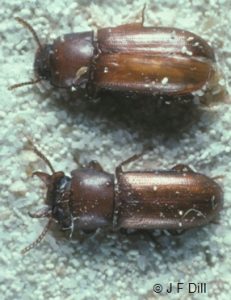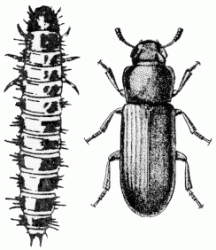Flour Beetles
Pest Management Fact Sheet #5021
James F. Dill, Pest Management Specialist
Clay A. Kirby, Insect Diagnostician
For information about UMaine Extension programs and resources, visit extension.umaine.edu.
Find more of our publications and books at extension.umaine.edu/publications/.
Description & Biology
Common flour beetles found in Maine include the confused flour beetle and the red flour beetle. They are similar in habits and appearance. Both beetles primarily infest flour and, to a small extent, foods made of processed grains. Confused flour beetles and red flour beetles are often found together. Even though they cannot attack whole grains, there are usually enough broken kernels and grain dust present (caused by the rubbing of grain during handling) for these beetles to survive. Any home can be invaded by these beetles through the transportation and storage of grains or grain products such as cereals, pasta, flour, etc.
Flour beetles are not known to carry or spread any diseases that affect humans. Nor do they attack anything other than grain or starch foods. However, in search of their favorite foods, they may become an annoyance, invading any and all areas of a home.
The beetles (adults) are shiny, flattened, reddish brown insects about 1/7″ long, and very active. The larvae are brownish to yellowish white, worm-like insects with three pairs of legs. They are about 1/16″ when fully grown.
- Flour Beetle larva and adult
Both species of these flour beetles can live up to three years. Unlikely to survive Maine’s winter temperatures, they seek protection in heated areas. Generally, these insects are considered weak fliers, but warm temperatures make them more active and–aided by the wind–they can apparently travel long distances.
Management
Sanitation: Emptying and cleaning food containers before replenishing supplies and checking foods stored for long periods are the most effective means of keeping flour beetles out of your kitchen. Plastic, glass, or metal containers with tight-fitting lids are also helpful.
Never discard foods infested with flour beetles. Instead, one can rescue the infested food by heating it at 125-140°F in an oven for 30 to 45 minutes to kill all stages of development. Placing the infested food in a freezer for five days at 0°F should also kill the pests. Otherwise, the infestation may spread. A vacuum cleaner is an excellent aid, but the bag should be sealed before disposing (or in the case of a bagless vacuum, empty the contents outdoors aftewards).
Insecticides: Household sprays such as cyfluthrin, permethrin, or tetramethrin are labeled for these pests. They must be used according to directions (only in cracks, crevices, corners, and under or behind things where insects are likely to hide).
When Using Pesticides
ALWAYS FOLLOW LABEL DIRECTIONS!
Pest Management Unit
Cooperative Extension Diagnostic and Research Laboratory
17 Godfrey Drive, Orono, ME 04473
1.800.287.0279 (in Maine)
Information in this publication is provided purely for educational purposes. No responsibility is assumed for any problems associated with the use of products or services mentioned. No endorsement of products or companies is intended, nor is criticism of unnamed products or companies implied.
© 2016, 2018, 2020 | Reviewed & Revised: 2023
Call 800.287.0274 (in Maine), or 207.581.3188, for information on publications and program offerings from University of Maine Cooperative Extension, or visit extension.umaine.edu.
In complying with the letter and spirit of applicable laws and pursuing its own goals of diversity, the University of Maine System does not discriminate on the grounds of race, color, religion, sex, sexual orientation, transgender status, gender, gender identity or expression, ethnicity, national origin, citizenship status, familial status, ancestry, age, disability physical or mental, genetic information, or veterans or military status in employment, education, and all other programs and activities. The University provides reasonable accommodations to qualified individuals with disabilities upon request. The following person has been designated to handle inquiries regarding non-discrimination policies: Director of Equal Opportunity, 101 Boudreau Hall, University of Maine, Orono, ME 04469-5754, 207.581.1226, TTY 711 (Maine Relay System).



